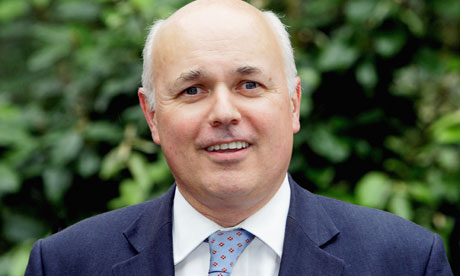The British government is spending £25bn a year on the consequences of social breakdown and a pittance on its underlying causes, Iain Duncan Smith said on Monday .
The work and pensions secretary is to propose a switch in spending towards early intervention, and to enlist private investors in his campaign.
Duncan Smith and the Department for Education want to form an Early Intervention Foundation, and to persuade the City and local authorities to invest up to £10bn to prevent social breakdown in a public-private partnership.
The intention is that investors would make money by backing projects or agencies that steer vulnerable people away from crime, drugs, unemployment truancy or family breakdown, so saving state spending on social failure.
A "payment by results" model is likely to be used. The organisation would try to unlock a new social investment market by listing successful early intervention schemes and by setting out indicative rates of return.
The foundation, which has Labour's backing, is to publicise intervention schemes that work, and tell investors how much money they might make over a fixed period.
Duncan Smith's social justice strategy paper suggests the current social investment market of £200m could grow to £10bn.
He said the aim over the medium term was to create "social impact Isas".
The strategy paper suggests "the growth of social investment could aid social cohesion, connect successful financiers and businesses with difficult communities and create a vested interest in delivering real and lasting improvements".
Duncan Smith said: "£25bn is spent on the consequences of family breakdown, and a pittance [is spent] on the people desperate to get support and that need support."
The social justice paper maps out the government's idea that stable caring families and early intervention are probably more important than tax credits for addressing the root causes of poverty.
Describing past Whitehall spending on problem families as dysfunctional, Duncan Smith said: "If you think [about] the kind of money that has been transferred in the last four or five years, in things like tax credits, you have to ask the question – to what degree did we achieve what we were after?
"The answer is much was probably achieved in terms of ticking a box, but did we achieve an outcome in terms of a changed life, a drug addict, family breakdown, improved education or debt?"
He said the existing child poverty measure "does not tell you very much other than you transferred money from one group to another".
What you did not know, he said, was what happened to that family in terms of their life chances. "If you just give people money, the chances are you just feed the problem, such as drug addiction, you don't solve it."
The Department for Education is to publish tender documents for groups wishing to bid to run the Early Intervention Board. The frontrunner is a consortium of children's charities and local authorities brought together by the Nottingham MP Graham Allen, a long-term campaigner for early intervention.
Duncan Smith said; "Over the next year or two the aim of the board will be to look at programmes that are out there, evaluate them and give them some kind of rate of return on investment percentage. Then we are short hop away from being able to invest in each of these programmes so you can create a market and bring in the private sector through social bonds".
One proposal is for local authority pension funds to invest in social impact ISAs on behalf of their staff. "One thing businessmen know about is investment and the need to drive up value. It would also lock business and private buyers back into difficult communities and areas."
Although Duncan Smith is a strong supporter of marriage, and favours ending the so-called couple penalty, his paper acknowledges that a loving relationship between partners is as important to a child's welfare.
The paper says: "Given that married relationships tend to have greater longevity and stability than other forms, this government believes that marriage often provides an excellent environment in which to bring up children.
"But many couples are choosing not to get married and still go on to provide good family environments. Evidence suggests that the way in which a family functions has more effect on outcomes for children than the type of family (eg whether they are a lone parent or married couple)."
The paper does not drop the government's existing child poverty target, a measurement of relative income inequality, but it is sceptical about its value.
The strategy line is: "Some £150bn was spent on tax credits from 2004-2010, much of which was targeted at families with children. However, projections recently published by IFS, suggests that despite this considerable spending several of the income targets in the Child Poverty Act are likely to be missed.
"Not all increases in income are equally beneficial. Income through benefits maintains people on a low income and can even risk bolstering welfare dependency and feeding social problems such as drug dependency."
Using his status as chair of a social justice cabinet committee, Duncan Smith has tried to draw together thinking and funding across the communities department, education, health and his own department of work and pensions.











